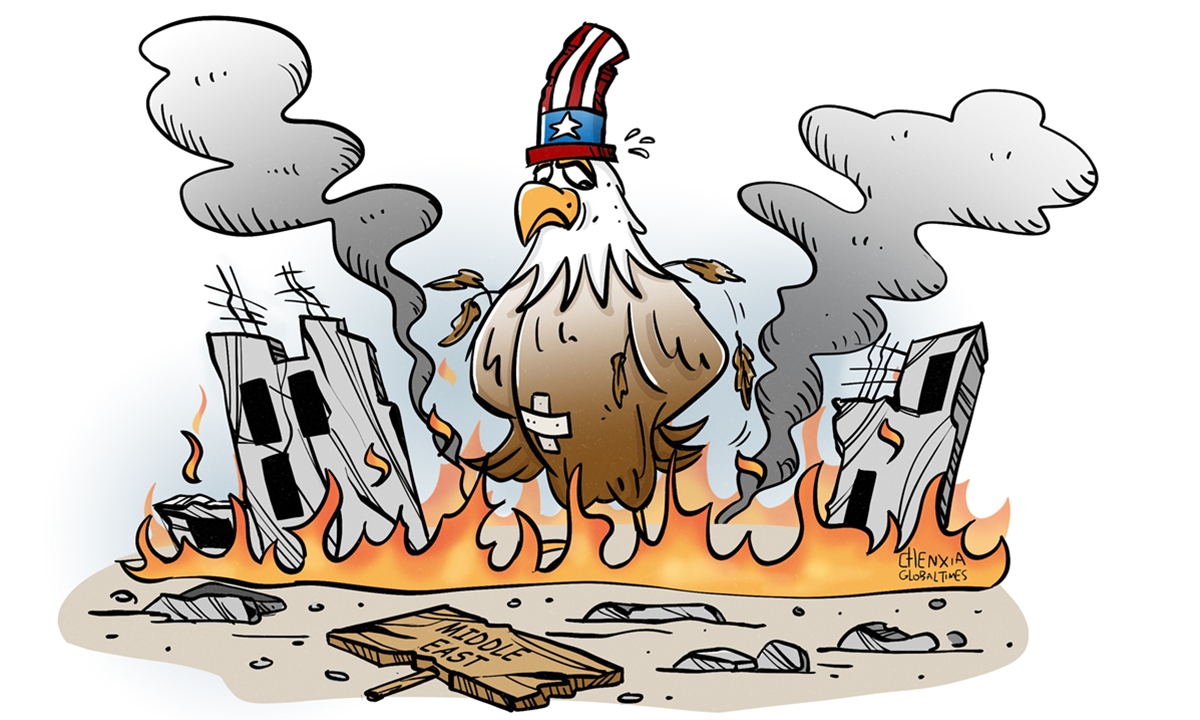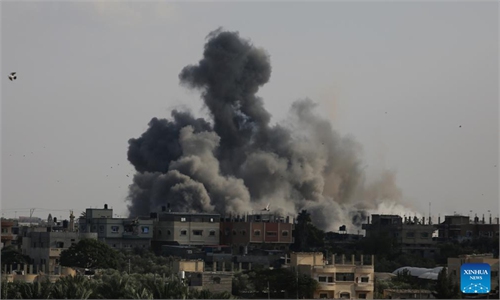Without effective intl mediation, regional hotspots likely to spill over in Middle East

Illustration:Chen Xia/GT
The recent local conflict in the Middle East is flaring up. Iran launched attacks on Israel's Mossad spy agency in Iraq on Monday. On Thursday, suspected Jordanian air strikes on Syria have triggered widespread concern among neighboring countries. Israel has launched attacks on targets in Lebanon and Syria. Amid the ongoing Israel-Palestine conflict and the escalation of the Red Sea crisis, the Middle East seems to be on the eve of a wider war.
After more than 100 days of conflict, the Israeli economy has been severely affected. Israel's need for arms has tremendously increased, especially for critical military equipment, such as precision-guided munitions and Iron Dome air defense missiles. Despite the calls for peace and an end to the war inside the country, the Israeli government still believes that the military operation in Gaza must be pushed ahead.
Recently, the US and the UK have been carrying out strikes on Houthi-controlled areas of Yemen. However, the military strikes have further intensified the strategic risk of the Red Sea. Last week, Yemeni Vice President Aidarus al-Zubaidi said that its military forces need foreign assistance to launch a ground operation against the Houthis.
It can be said that the fragile peace that has just emerged in Yemen is likely to be replaced by the resurgence of war.
In addition, Iran's recent attacks on targets in Iraq and Pakistan, and Jordan's suspected attacks on Syria, have been relatively limited in scale, and there is little likelihood of an escalating spillover of military operations.
Against the backdrop that Pakistan missiles struck Iran in a retaliatory bombing on Thursday, Iran has not continued to demonstrate a tough stance. Iran and Pakistan announced on Monday that they seek to mend relations after recently swapping air strikes, making it clear that the two countries have no intention of escalating the conflict.
As for the airstrikes in Syria, it is likely that they aimed to combat drug trafficking and production networks if they were indeed conducted by Jordan, a country that has been carrying out similar actions for many years to stop the inflow of those networks from southern Syria. Overall, the attacks, if conducted by Jordan, are a continuation of previous operations, and they only raised concerns internationally about the escalation of regional conflicts during a sensitive time like now.
In contrast, Israel's military strikes on targets within Syria and Lebanon could potentially become the biggest uncertainty factor in the regional conflict.
First, from Israel's perspective, Syria has become a "hub" for Iran and its Shiite militias. These groups, organized under the Islamic Revolutionary Guard Corps (IRGC) in Iran, are steadily approaching the Israel-Syria front, attempting to launch attacks against Israel. Additionally, Iran is targeting Mossad personnel operating abroad.
In this context, Israel has conducted multiple cross-border strikes inside Syria in recent weeks, resulting in the deaths of several members of the IRGC, escalating tensions between Israel, Syria and Iran.
Second, the clashes between Israel and Lebanon may escalate the regional conflict. In recent weeks, Israel and Hezbollah have continuously attacked each other, leading to fierce conflicts in the frontline areas. Moreover, Israel has conducted multiple cross-border strikes on key targets in Hezbollah-controlled areas, killing Hamas deputy chief Saleh Arouri and senior Hezbollah officer Wissam Tawil, intensifying concerns about the Israel-Lebanon front.
Third, under domestic political pressure, Israel is likely to continue targeting senior Hamas figures hiding in Lebanon and Syria, while simultaneously using military means to "deter" Shiite militias within Syrian territory. Due to the absence of Israel's diplomatic relations with Syria, Iran and Lebanon, as well as a lack of effective mediation channels, Israel's future military actions in Syria and Lebanon could potentially become the primary catalyst for escalating this round of regional conflict.
The Israel-Palestine conflict, the Red Sea crisis and the recent cross-border military operations by various regional countries all indicate the spill-over effects of conflicts in the Middle East. Given the complex relationships among the conflicting parties in the region, the current tensions on the local level may likely evolve into a wider war in the future without effective international mediation.
The author is an associate professor at Northwest University in China. opinion@globaltimes.com.cn

